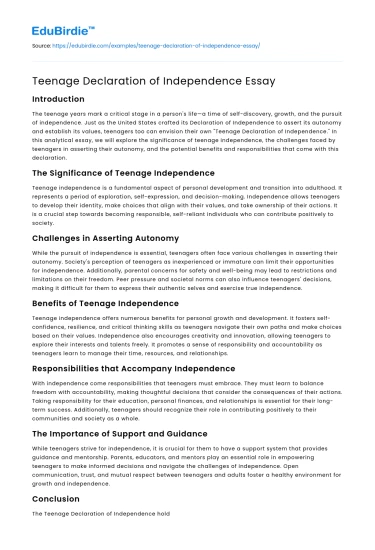Introduction
The teenage years mark a critical stage in a person's life—a time of self-discovery, growth, and the pursuit of independence. Just as the United States crafted its Declaration of Independence to assert its autonomy and establish its values, teenagers too can envision their own "Teenage Declaration of Independence." In this analytical essay, we will explore the significance of teenage independence, the challenges faced by teenagers in asserting their autonomy, and the potential benefits and responsibilities that come with this declaration.
The Significance of Teenage Independence
Teenage independence is a fundamental aspect of personal development and transition into adulthood. It represents a period of exploration, self-expression, and decision-making. Independence allows teenagers to develop their identity, make choices that align with their values, and take ownership of their actions. It is a crucial step towards becoming responsible, self-reliant individuals who can contribute positively to society.
Challenges in Asserting Autonomy
While the pursuit of independence is essential, teenagers often face various challenges in asserting their autonomy. Society's perception of teenagers as inexperienced or immature can limit their opportunities for independence. Additionally, parental concerns for safety and well-being may lead to restrictions and limitations on their freedom. Peer pressure and societal norms can also influence teenagers' decisions, making it difficult for them to express their authentic selves and exercise true independence.
Benefits of Teenage Independence
Teenage independence offers numerous benefits for personal growth and development. It fosters self-confidence, resilience, and critical thinking skills as teenagers navigate their own paths and make choices based on their values. Independence also encourages creativity and innovation, allowing teenagers to explore their interests and talents freely. It promotes a sense of responsibility and accountability as teenagers learn to manage their time, resources, and relationships.
Responsibilities that Accompany Independence
With independence come responsibilities that teenagers must embrace. They must learn to balance freedom with accountability, making thoughtful decisions that consider the consequences of their actions. Taking responsibility for their education, personal finances, and relationships is essential for their long-term success. Additionally, teenagers should recognize their role in contributing positively to their communities and society as a whole.
The Importance of Support and Guidance
While teenagers strive for independence, it is crucial for them to have a support system that provides guidance and mentorship. Parents, educators, and mentors play an essential role in empowering teenagers to make informed decisions and navigate the challenges of independence. Open communication, trust, and mutual respect between teenagers and adults foster a healthy environment for growth and independence.
Conclusion
The Teenage Declaration of Independence holds immense significance in the lives of teenagers as they navigate the path to adulthood. It acknowledges the rights, responsibilities, and aspirations of teenagers as they seek autonomy and self-expression. By asserting their independence, teenagers can develop their identity, make informed choices, and contribute to their communities. However, the journey towards independence is not without its challenges, as societal perceptions, parental concerns, and peer pressure can hinder their pursuit. Nonetheless, with the support and guidance of parents, educators, and mentors, teenagers can overcome these challenges and embrace their independence responsibly.
As teenagers craft their own Teenage Declaration of Independence, they pave the way for personal growth, resilience, and self-determination. It is through this declaration that they can exercise their rights, assert their values, and forge their unique path towards adulthood. Ultimately, the Teenage Declaration of Independence empowers teenagers to embrace their individuality, fulfill their potential, and become active contributors to society.






 Stuck on your essay?
Stuck on your essay?

